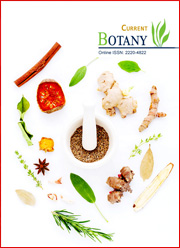IAA production and maize crop growth promoting potential of endophyte Aspergillus niger (AO11) under salt stress
DOI:
https://doi.org/10.25081/cb.2020.v11.5751Keywords:
Phytohormones; auxins; salt stress; symbiotic association; growth promotionAbstract
Maize is cultivated under a broad range of soil conditions and environments. Maize is slightly vulnerable to salt stress and therefore it is seriously affected by soil salinity all over the world. Recognizing the responses of maize to salt stress and making a good strategy to overcome this problem could aid to develop solutions in saline areas to improve maize productivity. We investigated in this research the impacts, tolerance and salt stress management in corn. Many endophytic fungi can produce the Indole-3-acetic acid (IAA) is known for their role in plant growth and development both with and without salt stress conditions. The current study was focused on the production of IAA by endophytic fungi (Aspergillus niger) and maize seeds germination and promotion of seedling growth and vigor. In order to evaluate the defense response of maize plant, in relation to A. niger, an experiment was designed with three replications of treatments (control, salt stressed, salt stressed inoculated with A. niger, and only A. niger inoculated plants. It was determined that A. niger has the ability to produce the IAA in NaCl and KCl stress peaking 53 μg/ml and was not significantly by alternating the nitrogen and carbon sources in the nutrient broth but increasing the tryptophan concentration raised its production level. High concentration stress of sodium chloride and potassium chloride decrease maize plant seeds germination percentage, shoot and root length also affected the fresh and dry weight of maize. A. niger improves salt resistance in maize and also increased the germination percentage up to 30%, also improved the chlorophyll level and it was proved an effective approach for improving maize germination and growth under salt stress.



 .
.